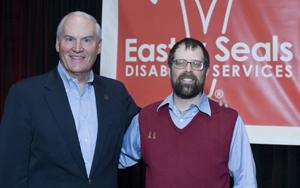Land of Lincoln, Obama and Clinton
by Patricia Wright
I moved to Illinois – and to my position as National Director of Autism Services for Easter Seals – a year ago. I value my right to vote, so of course I registered immediately.
And now with the presidential election looming in the not-too-distant future, I find myself voting in a state that two major Democratic candidates can call home. Sen. Barack Obama (D.-Ill.) represents the people of Illinois in the Senate, and although Sen. Hillary Clinton (D.-N.Y.) lives in New York now, she grew up in Park Ridge, Illinois.
Both of my “fellow Illinoisans” will be onstage at the Democratic presidential debate today at 2 – 4 p.m. EST. It’s an audio-only debate, sponsored by National Public Radio and Iowa Public Radio. I never bought a TV after I moved to Chicago, so trust me – I’ll be listening to my radio.
I know a vote should not be based on geography, and even if it was, I’d be conflicted: more than one candidate can lay claim to my home state.
Issues – issues is where votes are decided. My Easter Seals colleague, Katy Beh Neas, blogged last week about how autism is turning out to be an issue in the upcoming presidential campaign.
Messages about the care and treatment of people living with autism can be found side-by-side with messages about foreign policy, our economy and global warming. With the rates of people diagnosed with autism soaring — and the needs of individuals with autism and their families climbing ever higher — attention to autism has been elevated to the status it deserves.







 I had the pleasure of meeting Shore at our 2007 Easter Seals Training Conference in April. Shore is a well-known public speaker, and at the conference he provided a personal perspective on the experience of living with autism. His presentation was truly one of the highlights of the conference. There were over 400 people in attendance that day and they walked away with a much better understanding of autism.
I had the pleasure of meeting Shore at our 2007 Easter Seals Training Conference in April. Shore is a well-known public speaker, and at the conference he provided a personal perspective on the experience of living with autism. His presentation was truly one of the highlights of the conference. There were over 400 people in attendance that day and they walked away with a much better understanding of autism. This time of year, I find myself reflecting on what I am most thankful for. I have so many things in my life that have truly blessed me, but one of the most amazing blessings is having an autistic son.
This time of year, I find myself reflecting on what I am most thankful for. I have so many things in my life that have truly blessed me, but one of the most amazing blessings is having an autistic son.